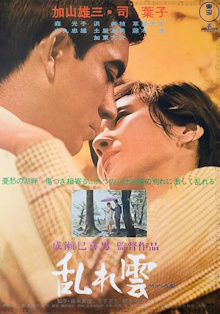Once again, Mikio Naruse falls just outside of the most celebrated Japanese directors of his era. Yet I’ve also found that this allows him to do things that are ever so slightly not Japanese. This must be one of the most unorthodox romances I’ve seen and like the other Naruse films is willing to present a seedier, grimier view of the society for the camera. With the understated passion of the two leads and dynamic camera work that takes readily to the outdoors, there are times when it feels positively European. The ending kind of has it peter out but that’s an acceptable tradeoff for what is otherwise a perfect film.
Yumiko and Hiroshi are a married couple who are looking forward to their first child. Hiroshi works for the powerful Ministry of Economy and Industry and is due to be promoted to a post in the US. But then one night Hiroshi is killed in a car accident and Yumiko’s life falls apart. The driver of the car Shiro is profoundly apologetic and the court later rules that the cause of the accident is a mechanical failure so he is not at fault. He voluntarily agrees to pay compensation to Yumiko anyway from his monthly salary for at least ten years in order to make amends. He is further punished by his trading company employer by being sent to a remote posting in Aomori Prefecture and his fiancée breaks up with him. Meanwhile Yumiko struggles to make a living in Tokyo. Eventually she moves back to her hometown where her sister runs an inn and by sheer chance it happens to be near Aomori as well. There they run into each repeatedly and they must grapple with the fact that they are attracted to one another despite the tragedy that connects them.
This was Naruse’s final film and is also one of the rare ones from that era to be in color. Naruse takes full advantage of this by capturing the scenic beauty of the famous Lake Towada and its environs. Going in cold, it can be quite a shock that Hiroshi dies so early on. But after that it’s an inevitability that circumstances will pull Yumiko and Shiro together even though Yumiko bitterly blames him at first for her husband’s death. It’s an unlikely romance but two leads make it work with a quiet passion that simmers under the surface. The tension builds from the taboo of there being any relationship between them even as they navigate the courtesies of polite society in their interactions. Yumiko regrets her earlier anger and wishes to absolve Shiro of the obligation to make monthly payments. Shiro in turn is plagued by guilt that he has killed a man, however inadvertently. It gets a little comical how they keep meeting each other but every meeting both sparks their mutual attraction and reopens old wounds.
If that were all there is to the film, it would have been an entertaining romance but not otherwise that remarkable. What consistently makes Naruse’s work stand out for me is his willingness to show the more unsavory details of Japanese society without focusing on them or moralizing about them. Here Hiroshi’s parents ask to remove Yumiko’s name from the family register, ostensibly so that she can find her own happiness. But as one of her sisters remarks, this also means that her late husband’s pension payments go to them instead. Meanwhile the Lake Towada inn is run by another sister who is openly the mistress of an already married local sawmill owner. Yumiko finds their relationship distasteful but never condemns her sister for it. These details and the sentiment that concerns about money shouldn’t be glossed over place the film in a real world context, not some imagined idealized society. Yumiko repeatedly states how terrible it is that she must live on the money that comes from her husband’s death but it still takes time for her to gain financial independence.
An interesting choice Naruse makes here is that while others tease Yumiko about her possible relationship with Shiro, no one really condemns either of them about it. This is especially true since they have the option of running away together to start a new life in a foreign country. So all of the opposition to their romance really stems only from themselves. I found the ending unsatisfying but there were few other ways that Naruse could do it.
